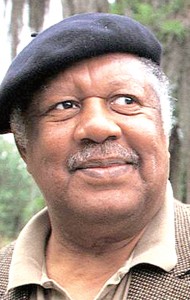Award-winning author Ernest Gaines dies
11th November 2019 · 0 Comments
By Meghan Holmes
Contributing Writer
On November 5, award-winning Louisiana author Ernest Gaines passed away at his home in Oscar, Louisiana. He was 86.
Gaines grew up in Pointe Coupee Parish, part of a family of sharecroppers on the River Lake Plantation, where he lived and worked until he moved to California in the 1940s. There, he began writing, and told stories of African Americans and Creoles in the rural South. His 1993 novel “A Lesson Before Dying” won the National Book Critics Circle Award, and he was also the recipient of a MacArthur Genius Grant.
Born in 1933, Gaines spent his early school-aged years at a segregated plantation school for African-American students, studying for five or six months a year and otherwise working the fields. When he turned 15, he moved to California, joining his mother and brother who had left the South in search of work at the end of World War II.
The family lived in a subsidized housing development in Vallejo, California, where Gaines discovered the public library, “not because he had volunteered to do so, but because his stepfather told him standing on street corners after school was going to get him into a lot of trouble,” the author said, during a speech when he won Louisiana’s Humanist of the Year Award in 1989.
In the segregated South, African Americans were not allowed in the library. When Gaines went inside for the first time, he “had never seen so many books. There was no library in his little school, so the only books he had read, except for the Bible, were textbooks…now there were so many books,” Gaines said in the speech.
He read voraciously, absorbing American, French and Russian literature, all while wondering how to articulate his own experience as an African American. Aside from a select few authors including Welty, Twain and Faulkner, Gaines found white depictions of southern African Americans “unrecognizable.” He found Russian writers appealing because they understood serfs, and sometimes let them outsmart their masters.
Gaines finished his first novel at 17, but it was years before he became a commercial success. He graduated with a degree in literature from San Francisco State University in 1956, spent two years in the army, and then attended Stanford University with a literary fellowship. He was working odd jobs and writing in California until 1962, when he decided to return home to Louisiana, “to be with the thing I wanted to write about,” he told CNN in 2010.
By the early 1970s, Gaines had published “The Autobiography of Miss Jane Pittman,” a critically-acclaimed novel detailing the titular character’s journey through slavery and into the Civil Right’s Era. Officially a success, he continued publishing and began teaching creative writing at the University of Louisiana Lafayette in 1981.
In 2008, the university established the Ernest J. Gaines Center in his memory, and announced his passing with a press release on their website, describing the author as a “towering man with a gentle voice… who is an inspiration to generations. His death will be felt deeply by family, friends, and his University family.”
Gaines worked in the university’s creative writing department until his retirement in 2010.
In the early 2000s, Gaines and his wife began purchasing land next to the cemetery where his ancestors are buried in Pointe Coupee. They rebuilt the church where he received his first school lessons, and started an annual decoration day. For Gaines, this was one way to pay tribute to the people who inspired his work. On November 5, 2019, he passed away at the home he had built there, close to where his family has lived for generations.
This article originally published in the November 11, 2019 print edition of The Louisiana Weekly newspaper.




